
Kirtland Safety Society Bank
What is the history of the Kirtland Safety Society Bank? What was it an "anti" bank? Why was it started and why did it fail?
The Kirtland Safety Society Bank was started on November 2, 1836. The bank's constitution established the capital stock of four million dollars, a severe overextension of the available specie in the area. When the Saints were refused a banking charter they set themselves up, instead, as an "Anti-Banking Company." Despite Joseph Smith's assurances that they had plenty of money, the realty was that the bank did not have the needed funds by any stretch. According to Warren Parish, they only $6,000 in the bank and over $150,000 of bills circulating that would soon become worthless.
Timeline of the Kirtland Safety Society Bank & Anti-Bank
2 November 1836 The Saints start the Kirtland Safety Society Bank
20 December 1836 A subscription list is started for the Bank
2 January 1837 In the absence of a bank charter, they reorganize into the "Kirtland Safety Society Anti-Banking Company"
2 January 1837 They update their Articles of Agreement for the Anti-Bank
6 January 1837 Wilford Woodruff says that this bank came by revelation
10 February 1837 A petition for bank charter for Kirtland Safety Society Bank was rejected by state senate
March 1837 They revise their Articles of Agreement
31 March 1837 A local newspaper expresses that the "Mormon Bank closed its doors against all demands"
August 1837 In the Times and Seasons Joseph Smith warns against "bills of the Kirtland Safety Society Bank"
3 September 1837 By this time the bank had failed
12 January 1838 A warrant is issued for the arrest of Joseph Smith for banking fraud
12 January 1838 Joseph Smith receives a revelation that he is to get out of Kirtland
12 January 1838 Joseph travels all night on horseback until he gets to Norton Township, Medina, Ohio
15 February 1838 Warren Parish reports that the bank was indeed a revelation and that it would "survive when all others should be laid in ruins."
24 March 1838 Warren Parish essentially says that Joseph Smith lied about the specie in the vaults and bills in circulation
Ratification of Kirtland Safety Society Bank
Consitutition
2 November 1836
Stockholders of Kirtland Safety Society Bank ratified its constitution; JS elected as cashier, Kirtland, Ohio.
Joseph Smith
History, 1838–1856, volume B-1
[1 September 1834–2 November 1838]
October–November 1836
<Note N <& P> addenda p 4> <note P also.>
<October.> Through the month of october the Saints continued to gather at Shoal creek, Missouri, And my attention was particularly directed to the building up of Kirtland, and the spiritual interests<November> of the church, and on the 2d of November the Brethren at Kirtland drew up certain articles of Agreement, preparatory to the organization of a Banking Institution, to be called the Kirtland Safety society.
President O[liver] Cowdery was delegated to Philadelphia to procure plates for the Institution; and Elder O[rson] Hyde, to repair to Columbus, with a petition to the Legislature of Ohio, for an act of incorporation, which was presented at an early period of their session, but because we were Mormons, the Legislature raised some frivolous excuse, on which they refused to grant us those banking privileges they so freely granted to other, thus elder Hyde was compelled to return without accomplishing his this object of his Mission, while elder Cowdery succeeded, in at a great expence, in procuring the plates, and bringing them to Kirtland.


Kirtland Safety Society Bank
Stock Ledger
18 October 1836–12 June 1837
From the Joseph Smith Papers Website:
When JS and other leaders of the Church of the Latter Day Saints took steps to establish a community bank in Kirtland, Ohio, in 1836, stock sales were vital to its success. In order to acquire the funds needed to operate the institution, which they named the Kirtland Safety Society, and redeem its banknotes for specie, the society solicited subscriptions from individuals interested in purchasing the society’s stock. The society’s constitution and articles of agreement set the capital stock at $4 million and divided that amount into 80,0000 shares of stock sold for $50 each. Stockholders could purchase as little as a single share of stock and as many as 3,000 shares. Once they agreed to purchase stock in the society, they were required to pay an initial installment of $0.26 per share of stock, based on the total amount of stock they had agreed to purchase.
The $50 price of stock for the Kirtland Safety Society was lower than average, but not unusually low when compared with similar financial institutions. What was substantially reduced was the amount stockholders were required to pay when they first subscribed for stock. At $0.26 per share, this payment was significantly lower than what other banks charged—typically between $5 and $50 per share.
Stock subscriptions began in mid-October 1836, when Sidney Rigdon purchased the first stock. On 22 October 1836, JS subscribed for 3,000 shares and made an initial payment of $1,342.69. The majority of stockholders in the Kirtland Safety Society subscribed for their shares of stock between October and December 1836. By January 1837, the society had more than one hundred stockholders who had paid nearly $12,000 in specie or banknotes to fulfill some portion of the first installment due on their stock. The Safety Society officers showed leniency to those who could not pay their full initial payment. Although individuals who subscribed for 1,000 shares should have made an initial payment of $262.50, many only ever paid a few dollars, and some never paid anything. This created a severe funding problem for the society.
The stock ledger featured here, which includes entries from October 1836 to June 1837, contains an individual account, spanning two pages, for each of the society’s stockholders. These accounts note the amount of stock the individual subscribed for and any payments or withdrawals made on the stock. Most stockholders were Latter-day Saints living in Kirtland, with a small number of Painesville residents also investing in the society. The majority of the stockholders were men, though a number of women also subscribed. Most subscribers were not wealthy, helping explain why many paid only a small portion of what they owed on stock to the bank. While some church leaders invested in the bank, the majority of stockholders held no leadership positions in the church.
A complete list of stockholders was never created, but a partial list was printed in the March 1837 issue of the church newspaper Messenger and Advocate. The ledger is the best contemporary source for identifying stockholders. However, the ledger may be incomplete, as some individuals named as subscribers in January 1837 do not appear in the book. In a few instances the names in the ledger were altered by knife erasure and overwriting from the original name inscribed in the ledger. This was probably done after the Safety Society had closed. However, these names can be recovered through careful analysis, along with a comparison to the contemporary index and aided by notations made by Arthur Deming, a church critic who acquired the book in the 1880s.
Subscription List for Kirtland Safety Society
20 December 1836
Kirtland Dec. 20th. 1836
We whose names <are> annexed, hereby bind ourselves to pay the Sums opposite the same, in Specie, or notes on Solvent Bank’s, as shall be directed by the officers of the Bank which is hereby formed, holding our real estate bound also, until the whole of Said Subscriptions shall have been paid in for the redemption of the bills issued by the Same. Said Subscriptions are for the purpose of establishing a Bank in this place, to be called the Kirtland Safety Society Bank, the Stock of which is to be divided into Shares of fifty Dollars each.
Name: Joseph B. Bosworth
Residence: Kirtland Ohio
No. of Shares: 2,000
Doll[ars] cts: $100,000
Name: [Blank}
Residence: Kirtland, Ohio
No. of Shares: [Blank]
Doll[ars] cts: $500
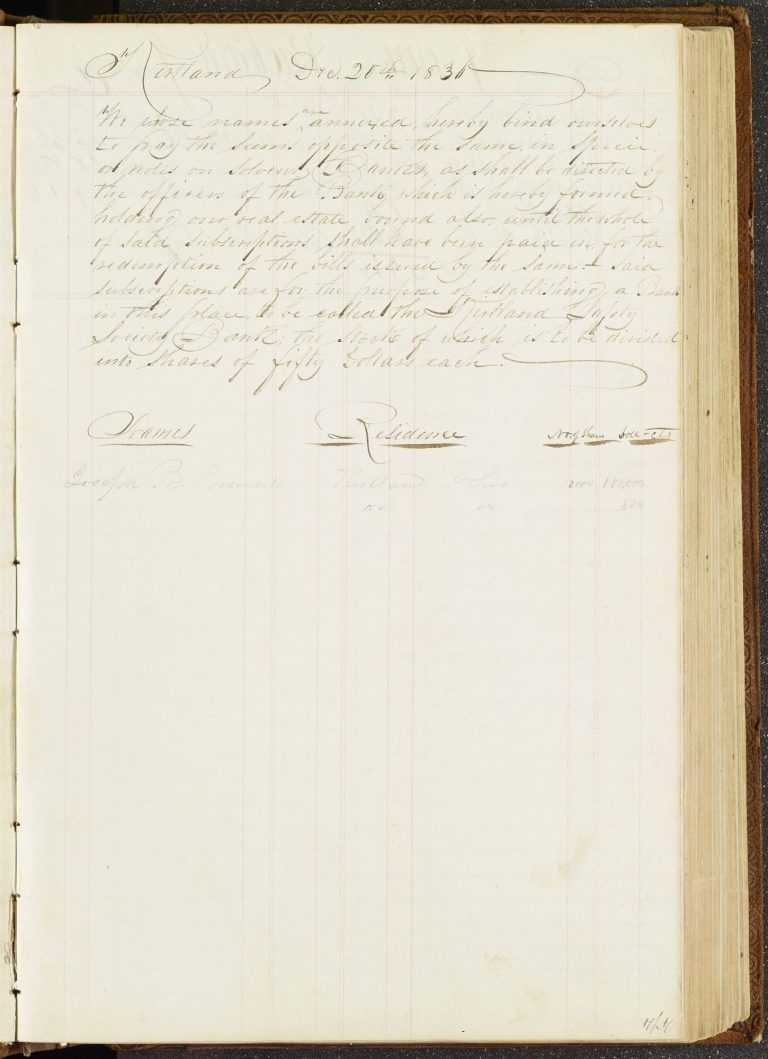
Reorganization of Kirtland Safety Society Bank
2 January 1837
In absence of bank charter, stockholders reorganized Kirtland Safety Society Bank as Kirtland Safety Society Anti-Banking Company and drafted new articles of agreement, Kirtland, Ohio.
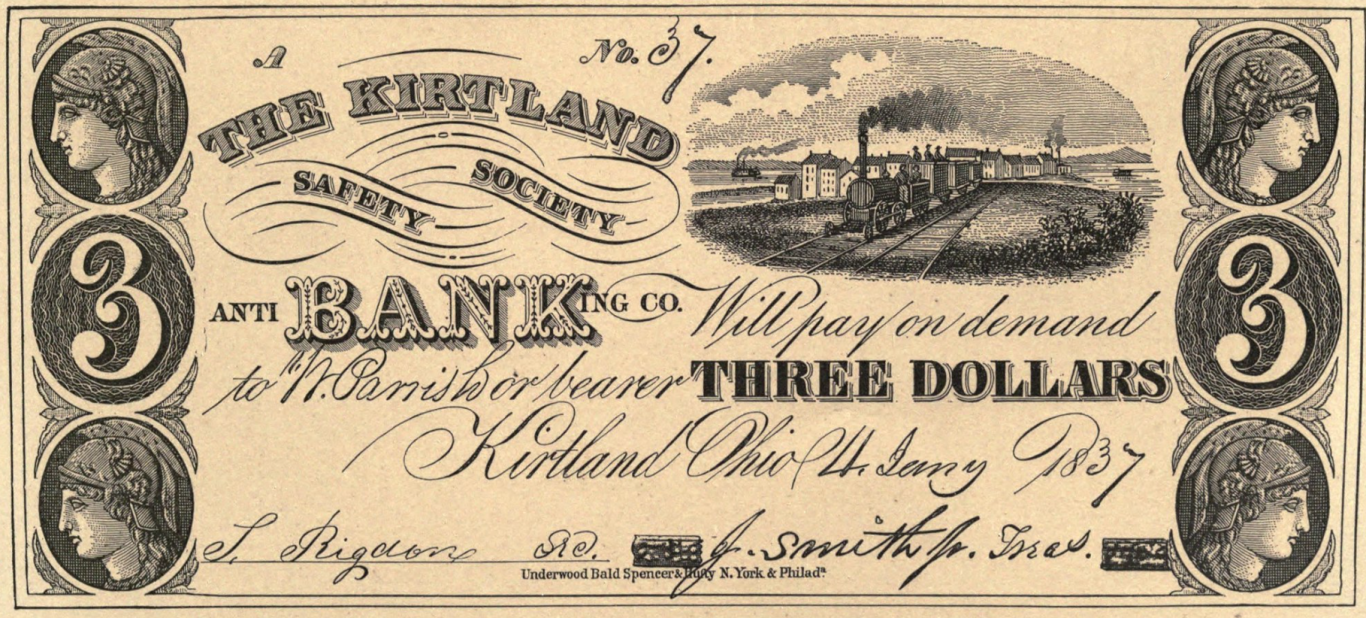
The bank notes were changed from the Kirtland Safety Society Bank" to "The Kirtland Safety Society Anti Banking Co." Critics point out that the small print of the words "anti" and the suffix "ing" and how the word "BANK" is displayed in large letters, would cause one to see this note as being issued from an official and authorized bank, which this was not.
Articles of Agreement
for the Kirtland Safety Society Anti-Banking Company
2 January 1837
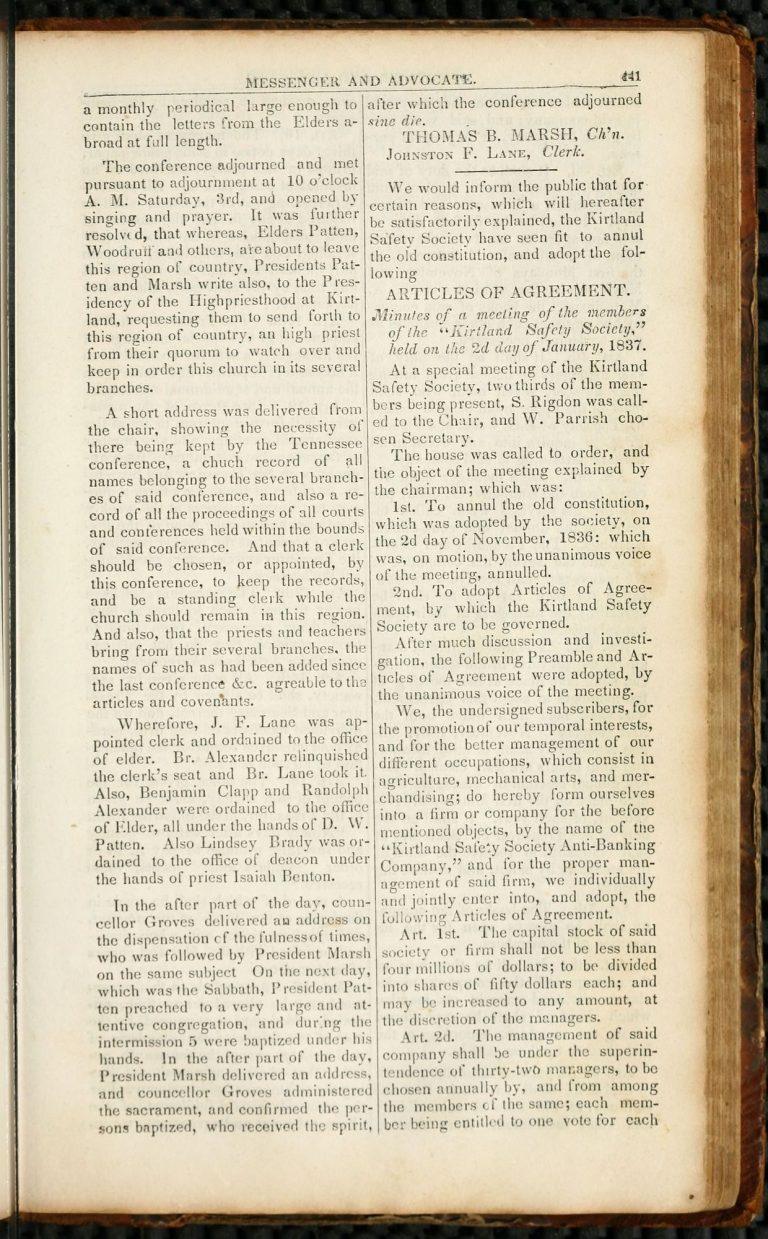
Minutes of a meeting of the membersof the “Kirtland Safety Society,”held on the 2d day of January, 1837.
At a special meeting of the Kirtland Safety Society, two thirds of the members being present, S[idney] Rigdon was called to the Chair, and W[arren] Parrish chosen Secretary.
The house was called to order, and the object of the meeting explained by the chairman; which was:
1st. To annul the old constitution, which was adopted by the society, on the 2d day of November, 1836: which was, on motion, by the unanimous voice of the meeting, annulled.
2nd. To adopt Articles of Agreement, by which the Kirtland Safety Society are to be governed.
After much discussion and investigation, the following Preamble and Articles of Agreement were adopted, by the unanimous voice of the meeting.
We, the undersigned subscribers, for the promotion of our temporal interests, and for the better management of our different occupations, which consist in agriculture, mechanical arts, and merchandising; do hereby form ourselves into a firm or company for the beforementioned objects, by the name of the “Kirtland Safety Society Anti-Banking Company,” and for the proper management of said firm, we individually and jointly enter into, and adopt, the following Articles of Agreement.
Art. 1st. The capital stock of said society or firm shall not be less than four millions of dollars; to be divided into shares of fifty dollars each; and may be increased to any amount, at the discretion of the managers.
Art. 2d. The management of said company shall be under the superintendence of thirty-two managers, to be chosen annually by, and from among the members of the same; each member being entitled to one vote for each share, which he, she, or they may hold in said company; and said votes maybe given by proxy, or in propria persona.
Art. 3d. It shall be the duty of said managers, when chosen, to elect from their number, a Treasurer and Secretary. It shall be the further duty of said managers to meet in the upper room of the office of said company, on the first Mondays of November and May of each year, at nine o’clock, A.M. to inspect the books of said company and transact such other business as may be deemed necessary.
Art 4th. It shall be the duty of said managers to choose from among their number, seven men, who shall meet in the upper room of said office, on Tuesday of each week, at 4 o’clock,P.M. to inquire into and assist in all matters pertaining to said company.
Art. 5th. Each manager shall receive from the company one dollar per day for his services when called together at the annual and semi-annual meetings. The Treasurer and Secretary, and the seven, the committee of the managers, shall receive a compensation for their services as shall be agreed by the managers at their semi-annual meetings.
Art. 6th. The first election of managers, as set forth in the second article, shall take place at the meeting of the members to adopt this agreement, who shall hold their office until the first Monday of November, 1837, unless removed by death or misdemeanor, and until others are duly elected. Every annual election of managers shall take place on the first Monday of November, of each year. It shall be the duty of the Treasurer and Secretary of said company, to receive the votes of the members by ballot, and declare the election.
Art. 7th. The books of the company shall be always open for the inspection of the members.
Art. 8th. It shall be the duty of the managers of the company, to declare a dividend once in six months; which dividend shall be apportioned among the members, according to the installments by them paid in.
Art. 9. All persons subscribing stock in said firm, shall pay their first installment at the time of subscribing; and other installments from time to time, as shall be required by the managers.
Art. 10. The managers shall give thirty days notice in some public paper, printed in this county, previous to an installment being paid in. All subscribers residing out of the State, shall be required to pay in half the amount of their subscriptions at the time of subscribing, and the remainder, or such part thereof, as shall be required at any time by the managers, after thirty days notice.
Art. 11th. The Treasurer shall be empowered to call special meetings of the managers, whenever he shall deem it necessary; seperate and aside from the annual and semi-annual meetings.
Art. 12. Two thirds of the managers shall form a quorum to act at the semi-annual meetings, and any number of the seven, the committee of the managers, with the Treasurer and Secretary, or either of them, may form a quorum to transact business at the weekly meetings; and in case none of the seven are present at the weekly meetings, the Treasurer and Secretary must transact the business.
Art. 13th. The managers shall have power to enact such by-laws as they may deem necessary, from time to time, providing they do not infringe upon these Articles of Agreement.
Art. 14th. All notes given by said society, shall be signed by the Treasurer and Secretary thereof, and we the individual members of said firm, hereby hold ourselves bound for the redemption of all such notes.
Art. 15. The notes given for the benefit of said society, shall be given to the Treasurer, in the following form:
“Ninety days after date, we jointly and severally promise to pay A. B. or order [blank] dollars and [blank] cents, value received.”
A record of which shall be made in the books at the time, of the amount, and by whom given, and when due—and deposited with the files and papers of said society.
Art. 16. Any article in this agreement may be altered at any time, annulled, added unto or expunged, by the vote of two-thirds of the members of said society; except the fourteenth article, that shall remain unaltered during the existence of said company. For the true and faithful fulfillment of the above covenant and agreement, we in dividually bind ourselves to each other under the penal sum of one hundred thousand dollars. In witness whereof we have hereunto set our hands and seals the day and date first written above.
In connexion with the above Articles of Agreement of the Kirtland Safety Society, I beg leave to make a few remarks to all those who are preparing themselves, and appointing their wisemen, for the purpose of building up Zion and her Stakes. It is wisdom and according to the mind of the Holy Spirit, that you should call at Kirtland, and receive counsel and instruction upon those principles that are necessary to further the great work of the Lord, and to establish the children of the Kingdom, according to the oracles of God, as they are had among us. And further, we invite the brethren from abroad, to call on us, and take stock in our Safety Society. And we would remind them also of the sayings of the prophet Isaiah, contained in the 60th chapter, and more particularly the 9th and 17th verses, which are as follows: “Surely the isles shall wait for me, and the ships of Tarshish first, and to bring thy sons from far, their silver and their gold (not their bank notes) with them, unto the name of the Lord thy God, and to the holy one of Israel, because he hath glorified thee.
[“]For brass I will bring gold, and for iron I will bring silver, and wood brass and for stones iron: I will also make thy officers peace, and thine exactors righteousness.” Also 62 ch. 1st vrs. “For Zion’s sake will I not hold my peace, and for Jerusalem’s sake I will not rest, until the righteousness thereof go forth as brightness, and the salvation thereof as a lamp that burneth.[”]
Joseph Smith, Jr.
[Articles of Agreement for the Kirtland Safety Society Anti-Banking Company]

Wilford Woodruff
6 January 1837
"I also heard President Joseph Smith Jr. declare in the presence of F. Williams, D. Whitmer, S. Smith, W. Parrish, and others in the deposit office that he had received that morning the word of the Lord upon the subject of the Kirtland Safety Society. He was alone in the room by himself and he had not only the voice of the Spirit upon the subject but remarked that if we would give heed to the commandments the Lord had given this morning all would be well. May the Lord bless Brother Joseph with all the Saints and support the above-named institution and protect it so that every weapon formed against it may be broken and come to naught while the Kirtland Safety Society shall become the greatest of all institutions on earth."
[Wilford Woodruff Journal, 6 January 1837]
Willard Richards
January 1837
In January 1837, Concerning the Kirtland Safety Society, Willard Richards wrote in January 1837 that “private property is holden & Kirtland bills are as safe as Gold." He was confident that the bank notes were secured by real estate.
[Joseph Smith Documents from October 1835 through January 1838, see footnote 59]
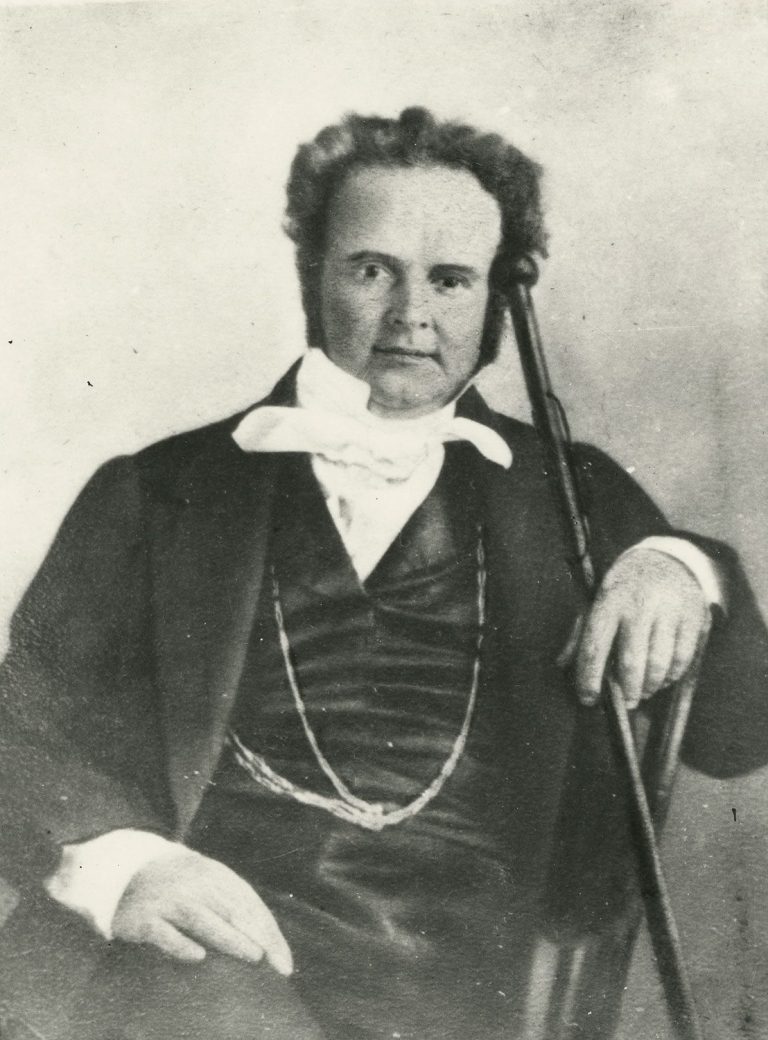
Painesville Telegraph
20 January 1837
A new revolution. -- Mormon Money. -- During the past two days an emission of bills from the society of Mormons, has been showered upon us. As far as we can learn there is no property bound for their redemption, no coin in hand to redeem them with, and no responsible individuals whose honor or whose honesty is pledged for their payment. They seem to rest upon a spiritual basis. -- Aside from the violation of the statute rendering them void, and of course the notes given for them, we look upon the whole as a most reprehensible fraud on the public, and cannot conceal our surprise that they should circulate at all. For instance, the large letters engraved on the bills appear, on a casual examination, to read like a Bank bill, and the unsuspecting would in the hurry of business, take them to be as an ordinary Bank bill. But on scrutiny it will be found that previous to the word "Bank" in capitals, the word "anti" in fine letter is inserted, and after the word "Bank," the syllable "ing" is affixed in small letters also, so far as to read in fact, instead of Bank, "Anti-BANKing." We do not object to private or company banking, as a system, provided it is done upon a system and made safe, but we consider this whole affair a deception, and are told by a legal gentleman, that there is still in force a section of the statute affixing a penalty of $1,000 to the issuing or passing unauthorized Bank paper like the present. It is a kind of radicalism that would flourish better in Michigan than Ohio. -- Cleveland Weekly Gazette.

Kirtland Safety Society Bank Petition
Rejected by Senate
10 February 1837
Petition for bank charter for Kirtland Safety Society Bank rejected by state senate, Columbus, Ohio.
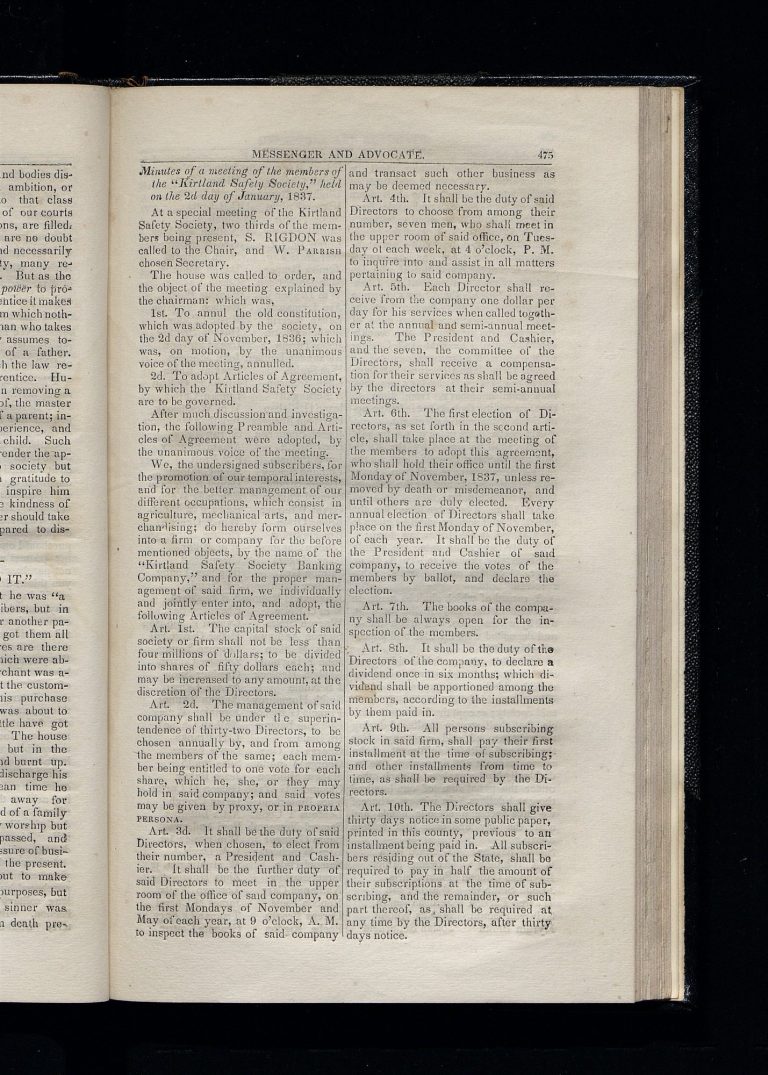
Revised Articles
of Agreement for the Kirtland Safety Society
March 1837
Minutes of a meeting of the members of the “Kirtland Safety Society,” held on the 2d day of January, 1837.
At a special meeting of the Kirtland Safety Society, two thirds of the members being present, S[idney] RIGDON was called to the Chair, and W[arren] PARRISH chosen Secretary.
The house was called to order, and the object of the meeting explained by the chairman: which was,
1st. To annul the old constitution, which was adopted by the society, onthe 2d day of November, 1836; which was, on motion, by the unanimous voice of the meeting, annulled.
2d. To adopt Articles of Agreement, by which the Kirtland Safety Society are to be governed.
After much discussion and investigation, the following Preamble and Articles of Agreement were adopted, by the unanimous voice of the meeting.
We, the undersigned subscribers, for the promotion of our temporal interests, and for the better management of our different occupations, which consist in agriculture, mechanical arts, and merchandising; do hereby form ourselves into a firm or company for the beforementioned objects, by the name of the “Kirtland Safety Society Banking Company,” and for the proper management of said firm, we individually and jointly enter into, and adopt, the following Articles of Agreement.
Art. 1st. The capital stock of said society or firm shall not be less than four millions of dollars; to be divided into shares of fifty dollars each; and may be increased to any amount, at the discretion of the Directors.
Art. 2d. The management of said company shall be under the superintendence of thirty-two Directors, to be chosen annually by, and from among the members of the same; each member being entitled to one vote for each share, which he, she, or they may hold in said company; and said votes may be given by proxy, or in PROPRIAPERSONA.
Art. 3d. It shall be the duty of said Directors, when chosen, to elect from their number, a President and Cashier. It shall be the further duty of said Directors to meet in the upper room of the office of said company, on the first Mondays of November and May of each year, at 9 o’clock, A. M.to inspect the books of said company and transact such other business as may be deemed necessary.
Art. 4th. It shall be the duty of said Directors to choose from among their number, seven men, who shall meet in the upper room of said office, on Tuesday of each week, at 4 o’clock, P. M.to inquire into and assist in all matters pertaining to said company.
Art. 5th. Each Director shall receive from the company one dollar per day for his services when called together at the annual and semi-annual meetings. The President and Cashier, and the seven, the committee of the Directors, shall receive a compensation for their services as shall be agreed by the directors at their semi-annual meetings.
Art. 6th. The first election of Directors, as set forth in the second article, shall take place at the meeting of the members to adopt this agreement, who shall hold their office until the first Monday of November, 1837, unless removed by death or misdemeanor, and until others are duly elected. Every annual election of Directors shall take place on the first Monday of November, of each year. It shall be the duty of the President and Cashier of said company, to receive the votes of the members by ballot, and declare the election.
Art. 7th. The books of the company shall be always open for the inspection of the members.
Art. 8th. It shall be the duty of the Directors of the company, to declare adivid end once in six months; which dividend shall be apportioned among the members, according to the installments by them paid in.
Art. 9th. All persons subscribing stock in said firm, shall pay their first installment at the time of subscribing; and other installments from time to time, as shall be required by the Directors.
Art. 10th. The Directors shall give thirty days notice in some public paper, printed in this county, previous to an installment being paid in. All subscribers residing out of the State, shall be required to pay in half the amount of their subscriptions at the time of subscribing, and the remainder, or such part thereof, as shall be required at any time by the Directors, after thirty days notice.
Art. 11th. The Cashier shall beempowered to call special meetings ofthe Directors, whenever he shall deemit necessary; separate and aside fromthe annual and semi-annual meetings.
Art. 12th. Two thirds of the Directors shall form a quorum to act at thesemi-annual meetings, and any numberof the seven, the committee of the Directors, with the President & Cashier, or either of them, may form aquorum to transact business at theweekly meetings; and in case none of the seven are present at the weeklymeetings, the President and Cashiermust transact the business.
Art. 13th. The Directors shall have power to enact such by-laws as they may deem necessary, from time to time, providing they do not infringe upon these Articles of Agreement.
Art. 14th. All notes given by said Society, shall be signed by the President and Cashier thereof, and we the individual members of said firm, hereby hold ourselves bound for the redemption of all such notes.
Art 15th. The notes given for the benefit of said society, shall be given to the Cashier, in the following form: “Ninety days after date, we jointly and severally promise to pay A. B. or order dollars and cents, value received.”
A record of which shall be made in the books at the time, of the amount, and by whom given, and when due—and deposited with the files and papers of said society.
Art. 16th Any article in this agreement may be altered at any time, annulled, added unto or expunged, by thevote of two-thirds of the members of said society; except the fourteenth article, that shall remain unaltered during the existence of said company. For the true and faithful fulfilment of the above covenant and agreement, we individually bind ourselves to each otherunder the penal sum of one hundred thousand dollars. In witness whereof we have hereunto set our hands andseals the day and date first written above.

Painsville Telegraph
31 March 1837
I perceive by the papers that the Monroe Mormon Bank closed its doors against all demands for specie, after having for its presiding officer about three weeks the wonderful and noted Oliver Cowdery, one of the fathers and translators of the Golden Bible. A sworn statement of the said shaving mill is published in the papers, by which it appears, that it has bills in circulation to the amount of $122, 585 -- and specie on hand, $1, 2008.59. Among various items of value on hand are "Bank furniture, Plates, &c. $4,500." QUERY. Do these last items include the golden plates and silver spectacles through which the medium of which the Vice President of this Bank and his Prophet Smith, manufactured a bible of 500 pages? If so, it may give great satisfaction to some people, as Smith once testified that the said plates were miraculously spirited away from his possession, and buried, he knew not where. The inference is, therefore, that Oliver Cowdery was the agent in making this valuable deposit in the Monroe Bank, after having cabbaged them from his prophet. Will uncle Steal over the way then explain this mystery in his next dun to his subscribers, as he professes to stand god father, or plays second fiddle to Mormonism. SERVANTES.
Pres. Andrew Jackson
May 1837
In May 1837, U.S. President Andrew Jackson ordered the U.S. Treasury to accept only gold for public land, rejecting privately printed paper money such as the Safety Society and other unchartered community institutions produced. This ultimately caused the Kirtland bank to fail.

W. A. Cowdery
Messenger & Advocate, July 1837
It is a well known and established fact that in the latter part of the year 1833 a bank, or monied institution, was established in this place denominated the "Kirtland Safety Society Bank." Plates were engraved in Philadelphia, paper struck, and the bank commenced discounting in the early part of the present year. It was considered a kind of joint stock association, and that the private property of the stockholders was holden in proportion to the amount of their subscription, for the redemption of the paper issued by the bank. No charter was obtained for the institution, which operated as one cause to limit the circulation of the bills, destroy public confidence in them, and stimulate the holders of them to return them again to the bank and demand the specie for them. Other banks which had been at the expense of procuring charters, refused the bills of this bank in payment of any debts due their respective institutions. This stand taken by other banks operated as might be reasonably supposed, to destroy the currency of these bills with men of business who had deal with the banks already chartered and established by law. By a clause in an act of the legislature of the State of Ohio passed January 28, 1834 no bills issued by an unincorporated bank can be collected by law, neither can the bank, banker or bankers collect any note bond or bill taken for the payment of bills of such unincoporated or unchartered bank. We will here insert the clause for the benefit of our readers who have not ready access to the Statute,

It can be found on the 460th page Ohio Statute; and reads as follows:
"That no action shall be brought upon any notes or bills, hereafter issued by any bank, banker or bankers, and intended for circulation, or upon any note, bill bond or other security given and made payable to any such, bank, banker, or bankers, unless such bank banker or bankers, shall be incorporated and authorized by the laws of this State, to issue such bills and notes: but that all such notes and bills, bonds and other securities, shall be held and taken in all courts as absolutely void."
Under these unpropitious circumstances the managers of the bank began its operation. There was a fair amount of specie in the vault to commence business, and friends enough who were ready to take the bills, carry them at a distance, and make exchanges for paper of other banks or specie, and return them to this place. But the unpopularity of our religion, together with the institution being an unchartered one, tended to render the circulation, as we before remarked, limited. At that time and a few weeks afterward, specie was promptly paid for the redemption of the bills when they were presented at the bank. It may here be proper to remark, that nearly all the specie had been drawn out of circulation, and most of the bills of specie paying banks to fill the vault, and make a safe basis for the redemption of the paper of this bank. When we say this, we mean, in this vicinity. We can also remark, that the banks generally had been limiting their issues for several months and the general cry was, that money was scarce. But real estate began gradually to decline, and every article of food to rise in price.
The great scarcity of money operated upon community to make every one anxious to have the new bills in circulation....
Joseph Smith
Latter Day Saints' Messenger and Advocate
(August 1837), 560.
Caution.
To the brethren and friends of the church of Latter Day Saints, I am disposed to say a word relative to the bills of the Kirtland Safety Society Bank. I hereby warn them to beware of speculators, renegadoes and gamblers, who are duping the unsuspecting and the unwary, by palming upon them, those bills, which are of no worth, here. I discountenance and disapprove of any and all such practices. I know them to be detrimental to the best interests of society, as well as the principles of religion.
JOSEPH SMITH Jun,

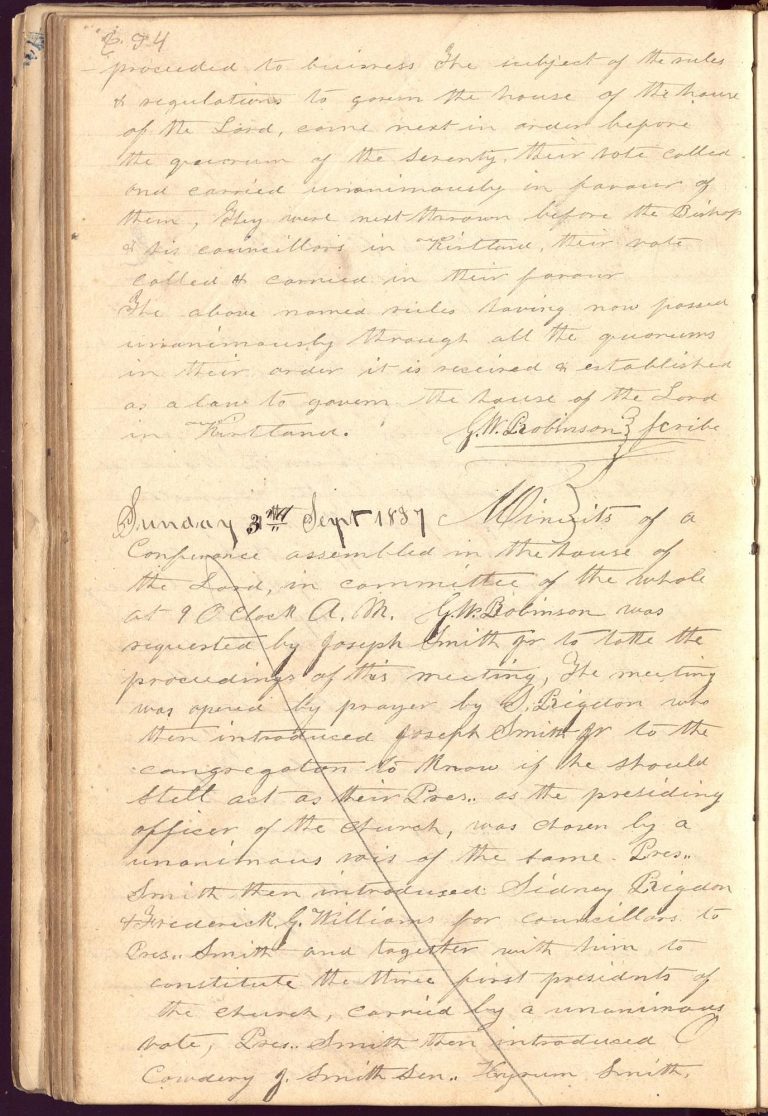
Minutes
3 September 1837
From these Minutes taken, we understand that by September 3, 1837, the bank had failed.
John F. Boynton was a member of the Quorum of the Twelve and had difficulties with the Church due to the failure of the bank which he was told would never fail. He was excommunicated for "apostasy".
Elder Boyngton which was the onley one present at the time arose and parsailly [partially] confessed his sins and partly justifying his conduct by reason of the failure of the bank, his acknowledgments appeared not to be satisfactory, his conduct was strongly protested against, by Elder Brigham Young in a plain and energetick manner stating various reasons why he could not receive him into fellowship untill a hearty repentance6 was manifested, the Elder <Young> was followed by Elder Marsh who acquiesed in testimony, and allso disfellowshiped the conduct of Elder Boyngton
President Rigdon then arose, & made an address of conciderable length, showing the starting point or cause of all the difficulty of Elders Boyngton & Johnson, he allso cautioned all the Elders, concrning leaving their calling to persue any occupation derogatory to that calling,7 assuring them that if persued, God would let them run themselves into difficulties, that he may stop them in their career, that salvation may come unto them,
Elder Boyngton then arose and still attributed his difficulties & conduct to the failure of the bank, stating that the bank he understood was instituted by the will & revilations of God, & he had been told that it never would fail let men do what they pleased, Pres. Smith then arose, and stated that if this had been published, it was without authority, at least from him, he stated that he allways said that unless the institution was conducted upon righteous principles it could not stand, The church was then called upon to know whether they were sattisfied with the confession of Elder Boyngton, Voted in the negative Adjourned for one hour
Tried in Absentia
24 October 1837
Joseph Smith and Sidney Rigdon were tried in absentia on charges of unauthorized banking on 24 October 1837.
They were found guilty and fined one thousand dollars each.
[Geauga Co., OH, Court of Common Pleas, Court Records, 1807–1904, vol. U, pp. 353–364, 24 Oct. 1837, microfilm 20,279, U.S. and Canada Record Collection, FHL.]

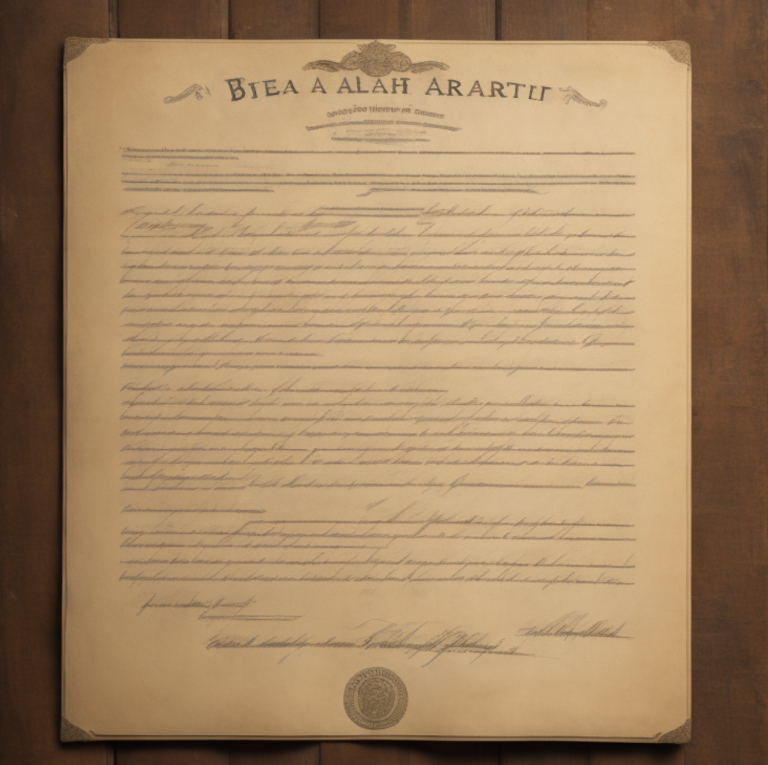
Warrant for Arrest
Joseph Smith
12 January, 1838
On January 12, 1838, a warrant was issued for Smith's arrest on a charge of banking fraud. Rather than submit to arrest, Smith fled the jurisdiction, escaping Ohio into Missouri.
Revelation
12 January 1838 - C
Thus saith the Lord Let the presidency of my Church take their families as soon as it is praticable and a door is open for them and move on to the west as fast as the way is made plain before their faces and let their hearts be comforted for I will be with them
Verily I say unto you the time [has] come that your laibours are finished in this place, for a season, Therefore arise and get yourselves on to a land which I shall show unto you even a land flowing with milk and honey you are clean from the blood of this people and wo unto those who have become your enimies who <have> professed my name saith the Lord, for their judgement lingereth not and their damnation slumbereth not, let all your faithfull friends arise with their families also and get out of this place andgather themselves together unto Zion and be at peace among yourselves O ye inhabitants of Zion or there shall be no saf[e]ty for you

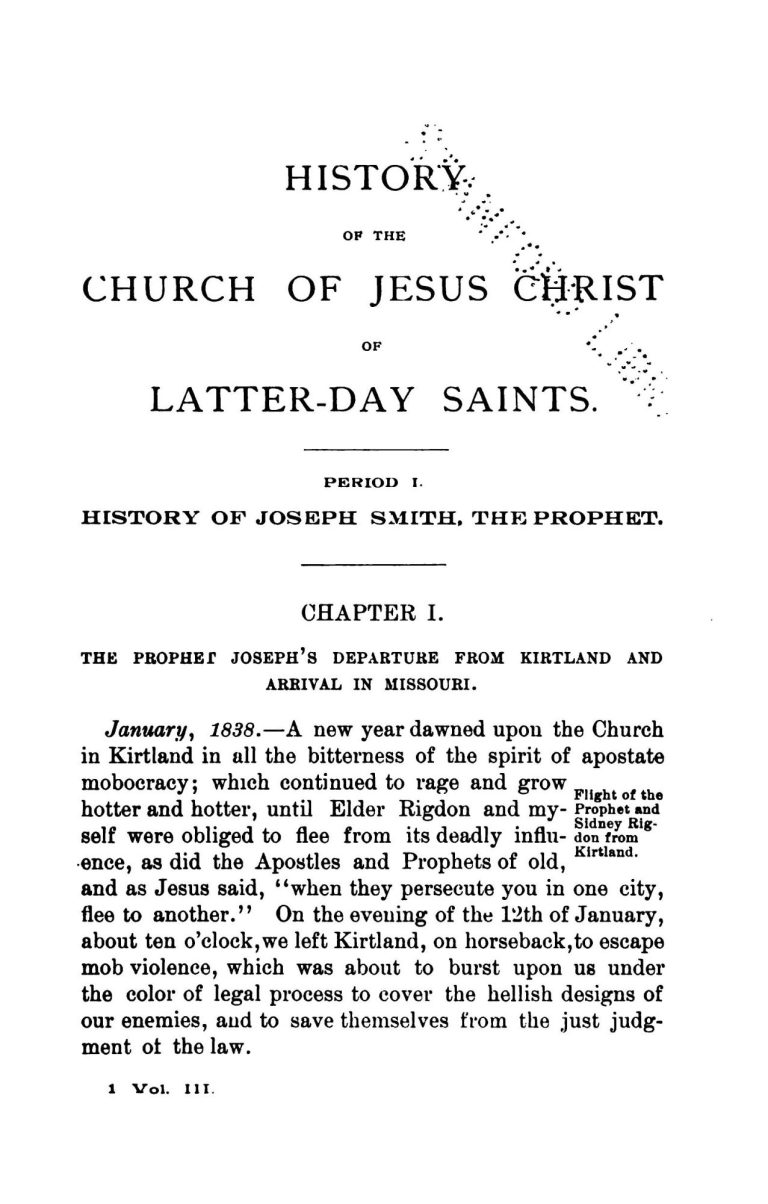
History of the Church
Volume 3, published 1902
"On the evening of the 12th of January [1838], about ten o'clock, we left Kirtland, on horseback, to escape mob violence, which was about to burst upon us under the color of legal process to cover the hellish designs of our enemies, and to save themselves from the just judgment to the law. We continued our travels during the night, and at eight o'clock on the morning of the 13th, arrived among the brethren in Norton Township, Medina county, Ohio, a distance of sixty miles from Kirtland..."
Warren Parish
Painesville Republican
15 February 1838
"I have listened to [the Prophet] with feelings of no ordinary kind when he declared that the audible voice of God instructed him to establish a Banking-Anti-Banking Institution, which, like Aaron's rod, should swallow up all other Banks (the Bank of Monroe excepted,) and grow and flourish and spread from the rivers to the ends of the earth, and survive when all others should be laid in ruins."


Warren Parish Letter
to Zion's Watchman
24 March 1838
"I have been astonished to hear him declare that we had $60,000 in specie in our vaults and $600,000 at our command, when we had not to exceed $6,000 and could not command any more; also that we had but about ten thousand dollars of our bills in circulation when he, as cashier of that institution, knew that there was at least $150,000."
Oliver Olney
3 March 1843
In 1843, Oliver Olney wrote a pamphlet titled "Absurdities of Mormonism Portrayed" and wrote a section on the Kirtland Bank.
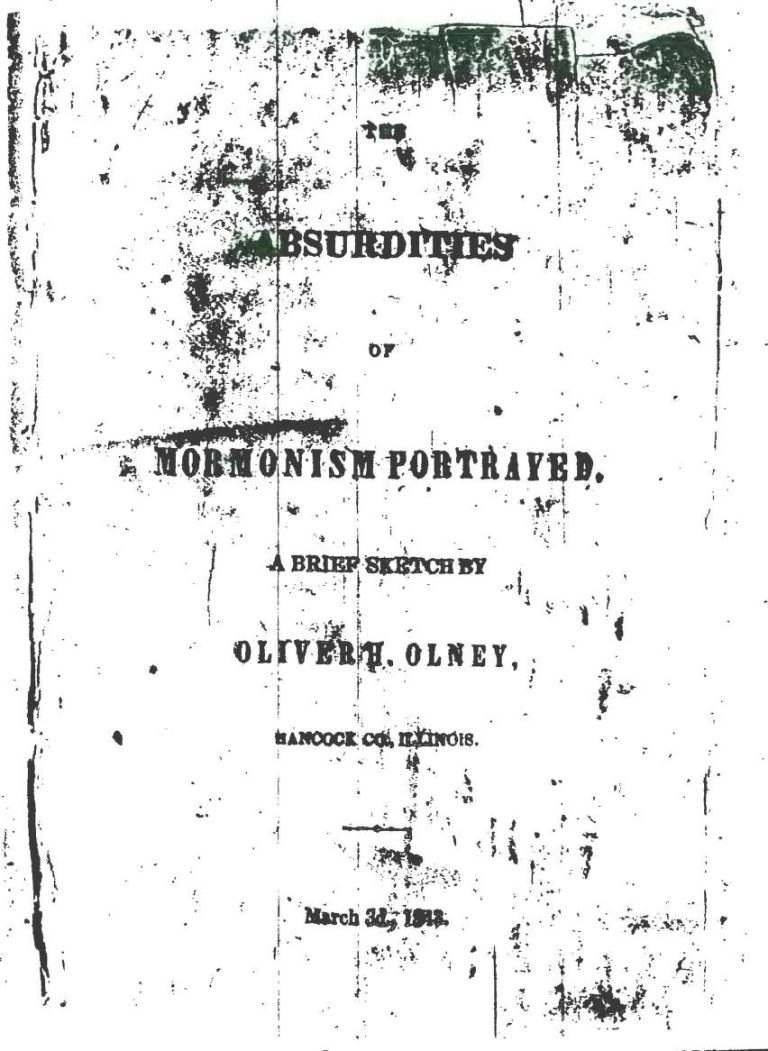
As Kirtland was the first Stake to be reared as an ensign to the nations of the Earth, many came together and commenced to build. All moved speedily. Lots of small dimensions soon raised in price, from .....thousands dollars a lot. Farms in the suburbs of the city seen raised, from ten and fifteen dollars per acre to one hundred and fifty in some cases. All moved fast; alkl were in business.
Yet money was scarce. That, almost to a man, they wanted to borrow. And property was continually raising in and around the city of Zion. They at least decided that a city could not prosper without .,... of its own. They of the Church soon met by hundreds and subscribed to a bank. Capital stock was called for, the books were opened, capitalist came forward and showed their good will to all a ... a Bank, as it was said to be a Revelation from God to do it. They signed from one thousand dollars cash to five hundred thousand dollars. There was no lack of capital to start on. The installments were soon called in, but those that signed the lease, I think in the most of cases, payed in the most stock. No time was lost to start a currancy. Money was .... plenty that hardly a man but what had a big roll of bills of the Kirtland Safety Funds to do business. Everything seemed to move with ... Hardly a man but what had credit to get their currency. .... went in every direction to change and put off as chances should occur. But to their surprise, they were soon sounded. That did many surprses, as their Bank was said to be established by a Revelation from God. Many contended that it could not be put down by man. They soon formed a union with the Monroe Bank of Michigan Territory. That ... to their circulation of currency. But their God soon failed them, it seems, and their currency went down, and the Monroe currency did but just go it.
As Pedlers .. to and fro from the Bank,
In ... with business men,
From different parts of the land.
They ... see themselves in difficulty.
As gold and silver began to be scarce,
They got ahold of a quantity of boxes,
And nearly filled them with sand,
Lead, old iron, stone, and combustibles.
["The Absurdities of Mormonism Portrayed" by Oliver H. Olney, pg. 4]

Heber C. Kimball
28 September 1856
"I went over about the time when the Church was broken up in Kirtland, and when there were not twenty persons on the earth that would declare that Joseph Smith was a Prophet of God."
Chauncey Webb
1886
''I personally lost $2,500 in that famous bank, of which Sidney Rigdon was President and Joseph Smith Cashier. I got for my money the blessing of the Lord, and the assurance that bye and bye the notes of that bank would be the best money in the country ! The bank was founded in 1836. Its origin dates from Joseph's idea to secure to all the Saints 'inheritances,' which they should possess in this life and in the other. Consequently, many elders were sent east with the instruction to get as much money as possible. The elders returned with money, and Smith now bought a tract of land called the 'Smith farm.'
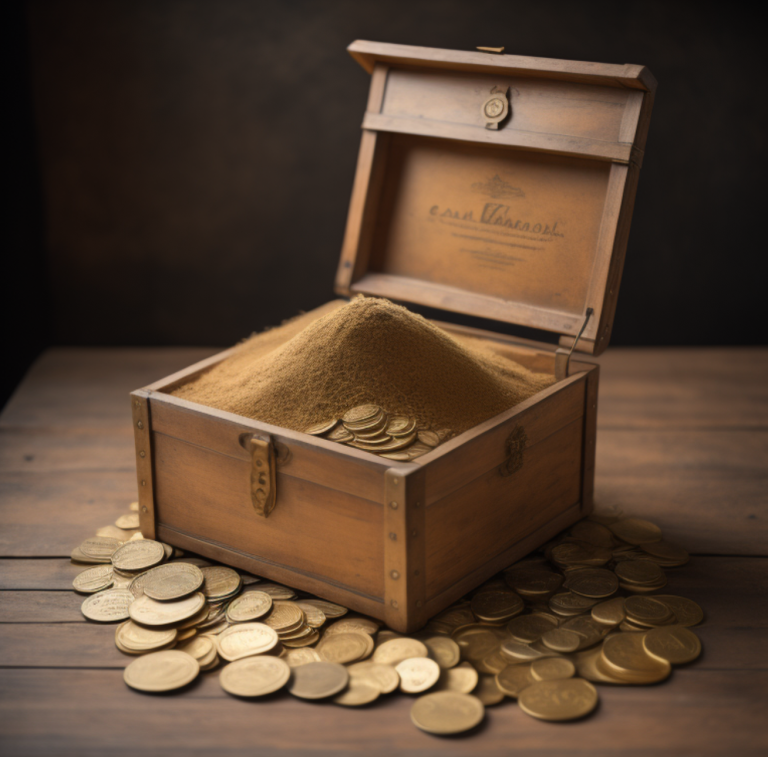
The temple was built and the city lots surveyed. But instead of receiving their 'inheritances,' the Saints had to buy them, and at good round prices, too. Joseph played auctioneer, and a very good auctioneer he was. The Saints were full of enthusiasm and lots went up from a hundred dollars to three and four thousand. This transaction brought some money into Joseph's capacious pockets and he now began to think of starting a bank in Kirtland. It was to be secured by real estate; but this was never done. They went to New York and had notes engraved, beautiful notes, the finest I had ever seen. In the bank they kept eight or nine window-glass boxes, which seemed to be full of silver; but the initiated knew very well that they were full of sand, only the top being covered with 50 cent pieces. The effect of those boxes was like magic; they created general confidence in the solidity of the bank, and that beautiful paper money went like hot cakes. For about a month it was the best money in the country. But the crash came soon, as everybody knows."
Yes, the crash came and the two bankers of the Lord had to leave Kirtland "between two days." But not because of their bank-swindle; the above-quoted ''Sunday School Catechism No. 1 " tells us that they left "to escape mob-violence." The swindled mob behaved shamefully indeed towards the man who had been appointed "Commander-in-chief of the Armies of Israel," and to whom Moses, "the great law-giver to ancient Israel," had given personally "the keys of the gathering of Israel." All that is in this useful little Catechism of 1882.

Christopher Crary
1893
"It was marvelous to see with what tenacity they held to their faith in the prophet, when they knew they had been robbed, abused and insulted."
[Christopher Crary, "Pioneer and Personal Reminiscences." pg. 45]
[Page 49] He says that the Mormon bank was not based on cash in the vaults, but on the pledge of real estate. I deny that there was any tangible pledge of real estate whatever. It was an unchartered institution, and therefore a violation of the laws of Ohio. But, says Kelley, there were one hundred and seventy-five stockholders whose real estate was pledged for the redemption of the bills. From what I knew of the Mormons at that time I think not one in ten owned unencumbered real estate; and whatever talk there may have been among themselves of pledging the half acre lots they had bargained for at $500 or $1,000, with but little if anything paid down, it amounted to nothing that holders of the bills could reap any benefit from whatever. The bank collapsed in a few weeks after the first issue of bills, and there was considerable clamor among the brethren, and the building was searched but nothing found except lead, etc. I had this from a Mormon, who then renounced his faith.
[Page 50] Last April, a lady in Chardon found in grandfather's old desk in a secret drawer $95 Mormon money. It is quite probable that it was taken for a horse. Brother Kelley seems to draw some consolation from the fact that it was hard times, and that other banks with fictitious capital failed. All banks did suspend specie payments several months after the Mormon bank collapsed, but all honest banks based upon capital came through all right. I was living near there at the time and took much interest in the bank, hoping it would succeed and enable us to sell out and get away. I attended one or two meetings where bank business was talked up, and believe that I know more about the inside and outside workings of the bank than E. L. Kelley, who was probably not born at that time, and has obtained his knowledge second and third-handed and from a one-sided source...
[Page 54] Kelley says there were about one hundred and seventy-five stockholders to the Kirtland Bank, whose real estate was pledged for the redemption of the bills, when in fact, there was but one stockholder, and that one was Joe Smith.
{page 55] Sidney Rigdon may have thought himself a stockholder, and no doubt had some share of the swag, but Smith was the real stock or stakeholder. Having sold my farm to a Mormon on credit, and bought again, I looked to the success of the bank to save me from financial ruin. On investigation, I found that no one had taken stock, but a few had deposited with Joe Smith small amounts, as they would in a savings bank, for safe keeping, to be drawn out at pleasure. (It was so safe they never saw but little of it again.) When the bills were received from Philadelphia, (I think in January, 1837,) the private notes that Smith and Rigdon were owing were taken up with the bills, and a small portion of the deposits were drawn out. The bank then closed its doors. I think no one ever borrowed a dollar or discounted a note at the bank. In a few weeks the bills were sold for $3.00 per $100.00. A gentleman of Kirtland told me last fall that he bought several hundred dollars of the stuff, paying $3.00 in good money for $100.00 of it. It was sent off to distant parts, where Mormon credit was not known, and shoved off; mostly for teams, which enabled the whole community of the faithful to move off to Missouri in the spring of 1838. About October, 1836, Joe Smith brought on several thousand dollars worth of dry goods. It was generally believed they were paid for with money deposited with him to start the Kirtland Bank. In a month or so the goods were turned out to pay for farms, the purchasers paying the cash to Smith and Smith paying the seller in goods. My brother's father-in-law, Deacon Holbrook, took $1,500 in goods; the first and only payment on his farm. Lory and Charles Holmes sold their farms and took payment out of Smith's store, and some others not now remembered at any rate, the store was closed out before the bank started, as it would be very unpleasant for Smith to sell goods and refuse to take his own paper in payment.
That Kirtland Bank was a swindle from beginning to end. Kelley quotes a caution, purporting to be from Joe Smith, as follows: "Caution. -- To the friends and brethren of the Church of Latter Day Saints: I am disposed to say a word relative to the bill -of the Kirtland Safety Society Bank. I hereby warn them to beware of speculators, renegades and gamblers who are duping the unsuspecting by palming upon them those bills, which are of no worth." Now, I don't believe Joe wrote it; it does not sound like him. But if he did, why the caution to the brethren. He had the custody and control of the bills, while he or his agents or followers were selling them for three cents on the dollar, to be palmed off upon the Gentiles. From my acquaintance with Joe Smith of six or seven years, and considerable dealing with him, I have formed this opinion of him: That he was a man of great magnetism, plausibility of speech that carried conviction of truth and sincerity; an inordinate love of flattery and a cold, heartless, grasping cruelty of disposition not surpassed by that of Jesse James. His magnetism and plausibility are proved by the unquestioning belief of his followers. His greed is proved by his ownership of the Temple, the printing press, the bank and all the money that he could lay his hands on.
[Christopher Crary, "Pioneer and Personal Reminiscences." pg. 45]
Note: Christopher Crary appears in a Land Deed in which he deeded land to Alvah Beman. [Deed, Oliver and Lydia Dibble Granger to John Howden, 30 April 1838].
© Copyright. All rights reserved.
We need your consent to load the translations
We use a third-party service to translate the website content that may collect data about your activity. Please review the details in the privacy policy and accept the service to view the translations.